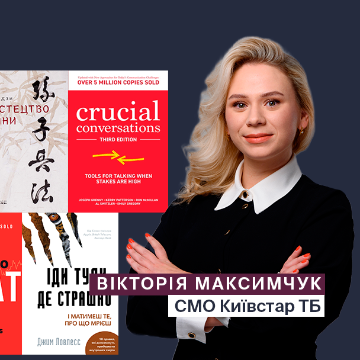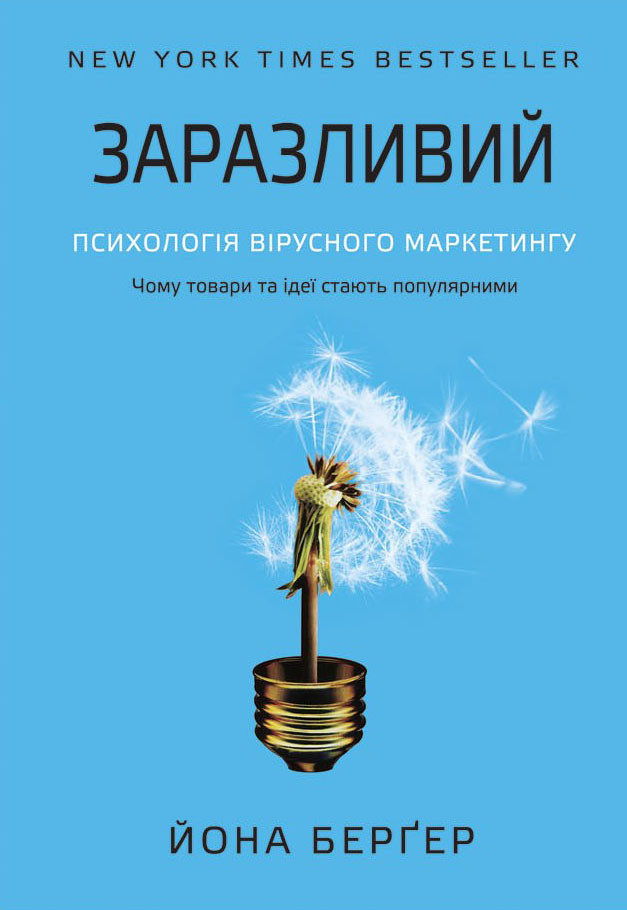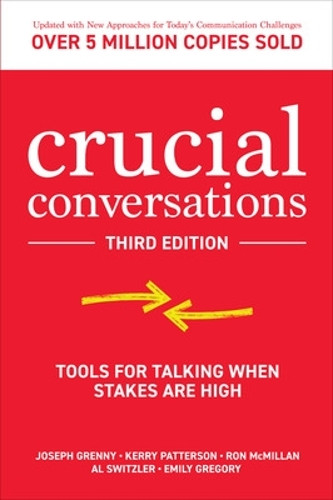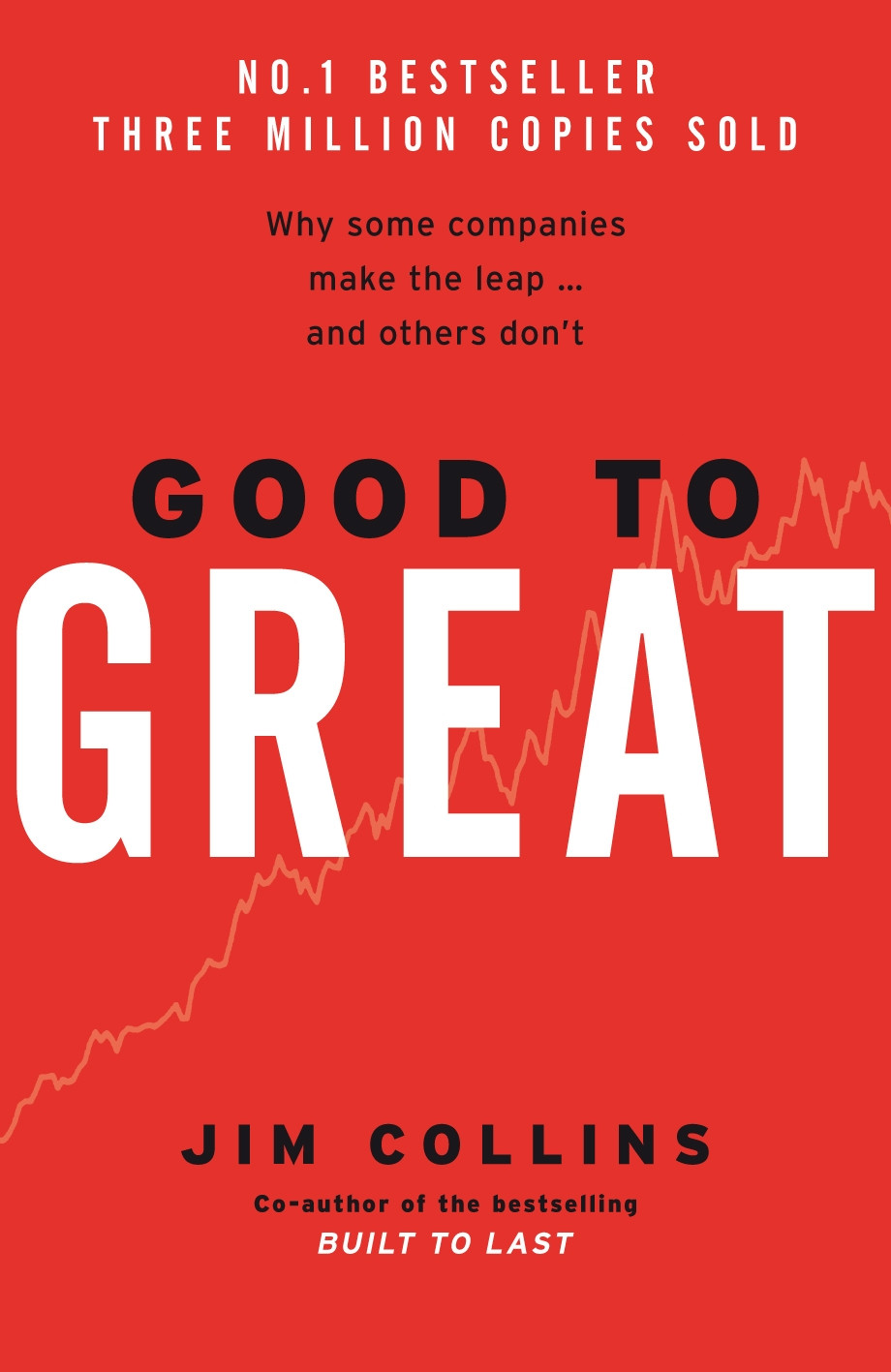
A selection of books from Victoria Maksymchuk, CMO of Kyivstar TV
1+1 media and the national book platform Yakaboo continue to promote the Ukrainian language, literature and support for the military. As part of the partnership, we share selections of the most relevant works and book recommendations from 1+1 media presenters and managers.
This time we are publishing a selection of books from Victoria Maksymchuk, CMO of Kyivstar TV.
In this selection, I have gathered several books that will be useful to marketers regardless of the business area they work in. From them, you will learn how to overcome the fear of the unknown and make important decisions with emotional stability, which helps in risky campaigns and innovative projects. You will also discover the basic principles of viral marketing, learn strategies for competitive analysis and adaptation to change, which can help you develop effective marketing strategies.
Effective communication, negotiation skills, and identifying key areas and brand strengths are extremely important skills in business. Fortunately, you can learn these skills if you have a strong desire and good books on your shelf. I will talk about some of them below.
1. ‘Go where the fear is’. Jim Lawless

I was once struck by the title itself: where there is fear, there is something new, and this is at least always interesting. This book will definitely be useful to everyone who is always proactive and runs to create and discover new things. At the same time, it will help people who always ‘really want’ something, but do not dare to do it.
One of the most valuable insights in the book is the advice not to make important decisions on bad days. We don't give up on good days. We usually do this when we face obstacles, criticism, when everything seems grey and rainy. The book reminds the reader of the importance of emotional stability and calmness when making decisions. It teaches us not to be afraid of the unknown, but rather to find new horizons for growth and development.
2. ‘Contagious’. Jona Berger

One of the book's insights is the importance of emotional content. Berger emphasises that the stronger the emotions an idea or product evokes, the more likely people are to share it with others. This reminds us that in marketing, it is important not only to provide useful information, but also to evoke an emotional response from consumers. I especially liked the concept of social currency and triggers that help us understand why people share certain information.
The book is based on six principles that Berger calls STEPPS:
1. Social currency: People share information that improves their status and looks favourable in the eyes of others. This can be something unique, interesting or useful that makes them socially significant.
2. Triggers: Memorable and frequent triggers remind people of a product or idea, thereby encouraging them to spread the word further.
3. Emotion: Emotional content is more likely to go viral. The stronger the emotions an idea or product evokes, the higher the chances that people will share it with others.
4. Publicity: The more people who see a product or idea being used, the more people will be inclined to adopt and spread it.
5. Practical value: People share useful information that can help others solve problems or improve their lives.
6. Stories: People love to tell stories. A product or idea woven into an engaging story has a better chance of going viral.
3. ‘The Art of War. Sun Tzu

It was one of the first books I started reading during the full-scale war. I can say that it has become to some extent my source of inspiration for developing new ideas. The principles outlined in the book show us that it is important to anticipate competitors' moves, assess risks and opportunities, and use resources efficiently. It is important not only to attack, but also to be able to retreat, adapt flexibly to changes and find creative solutions. This is a reminder that success depends on careful preparation, strategic thinking, and the ability to respond quickly to market changes.
4. ‘Crucial Conversations: Tools for Talking When Stakes Are High’. Al Switzler, Emily Gregory, Joseph Grenny, Kerry Patterson, Ron McMillan)

This book was once recommended to me by a colleague. It describes the importance of staying calm, creating a safe atmosphere for dialogue and active listening. Techniques that allow you to clearly express your thoughts without alienating the other person, as well as manage strong emotions during intense discussions. The ability to communicate clearly and compassionately in tense environments can improve teamwork and deliver better business results.
5. ‘Good To Great’. Jim Collins

Understanding your ‘hedgehog concept’ is an important thing that helps you focus on those areas and your strengths that bring the most value, without being distracted by unnecessary things. This book can show everyone who is ‘lost in themselves’ the direction in which to move forward, reach new heights and take your business to the next level.

